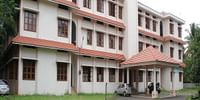Ph.D. (Physics)- Full Time
Doctor of Philosophy in Physics Top Colleges, Syllabus, Scope and Salary
Ph.D. in Physics is a 3-year doctorate degree in Physics. Physics is a natural science that involves the study of matter. The course covers the subjects of Matter Physics, High Energy Physics, Non-Linear Optics, Quantum Optics and Laser Physics, Solid State Physics and Materials Science, and Electronic Science. The areas of research include high TC superconductivity, attraction, stage moves, basic marvels, glasses and ceramics, liquid crystals, thin films, ion-solid interactions, semiconductors and super lattices, nanostructure materials, localization, percolation, molecular dynamics, neural networks, quantum field theory, quantum chromo dynamics, CP violation, heavy quarks, non-linear dynamics, quantum computing, stochastic-quantization, modern quantum optics including Femto-second laser experiments and theory, ferroelectrics, and microwave devices.
| Doctor of Philosophy in Tamil Nadu | Doctor of Philosophy in West Bengal | Doctor of Philosophy in Uttar Pradesh | Doctor of Philosophy in Kerala |
M.Phil. degree or M.Sc. in Physics or Material Science with a minimum aggregate score of 60% or equivalent CGPA (relaxed to 55% or equivalent CGPA for SC/ST) is the minimum requirement of eligibility for applying to the course.
Additionally, aspiring candidates need ought to have qualified any one of the following national-level tests in Physics in recent 2 years:
- CSIR/UGC-JRF or CSIR/UGC – LS with rank less than or equal to 200
- JEST/GATE with rank less than or equal to 300.
Selection to the course is based on the candidate’s performance in the round of Personal Interview.
Such postgraduates are hired in capacities such as Lab Supervisor, Subject Matter Expert, Researcher & Technician, Teacher & Lecturer, Scientist, Consulting Physicist, Senior Physicist, Technical Writer, Scientific Officer cum Tutor, Physics Teacher/Coach/Physics Trainer, and Training Manager.
The average tuition fee charged for the course in India ranges between INR 2,000 and 5 Lacs for a span of 3 years, and the average annual salary offered to such professionals ranges between INR 2 and 10 Lacs, increasing with experience and expertise in the subject.
Ph.D. in Physics: Course Highlights
Listed below are some of the major highlights of the course.
| Course Level | Doctorate |
| Duration | 3 years |
| Examination Type | Semester System |
| Eligibility | Post-graduation |
| Admission Process | Based on direct interview of the short-listed candidates. |
| Course Fee | INR 2,000 to 5 Lacs |
| Average Starting Salary | INR 2 to 10 lacs per annum |
| Top Recruiting Companies | CSIR-National Physical Laboratory of India, Physical Research Laboratory, Solid State Physics Laboratory, Indian Institute of Science, Physical Research Laboratory PRL Thaltej Campus. |
| Job Positions | Lab Supervisor, Subject Matter Expert, Researcher & Technician, Teacher & Lecturer, Scientist, Consulting Physicist, Senior Physicist, Technical Writer, Scientific Officer cum Tutor and such. |
Ph.D. in Physics: What is it about?
Typically, a Ph.D. program in Physics includes 5 or 6 core courses, with research and towards dissertation beginning in the second year of the course. Some programs allow students to earn their Master of Science (M.Sc.) in Physics degree concurrently. The course’s curriculum typically includes the following components of study:
-
Kinetics
- Solid-state physics
- Chemical thermodynamics
- Advanced thermodynamics
- Nanophysics
- Applied physics
The course is beneficial for candidates interested in pursuing advanced study in Physics and in specialized in a field of the discipline, such as Atomic and Condensed Matter Physics, Laser Physics, Particle Physics, and such.
Physicists study the basic laws of nature and for the most part contribute to the field through advanced research. They additionally apply their deductions, findings, and hypotheses to different ranges, for example, correspondences, science, construction, gadgets, geophysics, wellbeing, and science of transportation, among others.
Ph.D. in Physics: Who should opt?
Ideal candidates for the course would ideally possess:
- practical skills in planning, executing, and reporting experiments, using technical equipment
- attention to detail.
- the ability to use Mathematics to find solutions to scientific problems, create mathematical modelling, and interpret and present information graphically.
- good reasoning ability
- analytical skills
Top Institutes offering Ph.D. in Physics
Listed below are some of the top institutes in India that offer the course.
Eligibility for Ph.D. in Physics
As a minimum criterion of eligibility, aspiring candidates need meet the following minimum eligibility criteria:
- M.Phil. degree or M.Sc. in Physics or Material Science
- A minimum aggregate score of 60% or equivalent CGPA (relaxed to 55% or equivalent CGPA for SC/ST) at the level of post-graduation
- Qualification of any of the following national level tests in Physics in the last 2 years from applying to the course:
- CSIR/UGC-JRF or CSIR/UGC – LS with rank less than or equal to 200
- JEST/GATE with rank less than or equal to 300.
Selection is based on the shortlisted candidates’ performance in the round of personal interview.
| Doctor of Philosophy in Madhya Pradesh | Doctor of Philosophy in Andhra Pradesh | Doctor of Philosophy in Bihar | Doctor of Philosophy in Telangana |
Ph.D. in Physics: Admission Process
Admission to the course in India is made on the basis of the candidate’s performance in a relevant written test and/or a round of Personal Interview and/or performance in the relevant qualifying examinations. Candidates are shortlisted based on both academic record and performance in the relevant nation-wide screening test, such as:
For Physics (Experimental and Theoretical):
- Joint Entrance Screening Test (JEST)
- GATE in Physics
- CSIR/UGC NET for JRF in Physics
Ph.D. in Physics: Syllabus and Course Description
A semester-wise breakup of the course’s syllabus is tabulated here.
Semester I |
Semester II |
| Microtron Based Interdisciplinary Research | Nuclear and Radiation Physics |
| Environmental Radioactivity | Electro-optic and NLO Materials |
| Atmospheric Physics | Crystal Growth & Characterization |
| Amorphous Solids | Positron annihilation Studies |
Ph.D. in Physics: Career Prospects
Whether generally educated or coming from one of the sub-fields or interdisciplinary specializations, physicists today work in a variety of occupations inside and outside of academia, as researchers, physicists, and educators. Some prominent career options include:
- University professor
- Astrophysicist
- Business consultant
- Chemical physicist
As Researchers, such Physicists attempt to understand and dissect physical phenomena, often without a specific application as the objective. Applied research helps devise solutions to problems of national importance or of significant commercial value.:
As Instructors in academic institutions, such as high schools, community colleges, colleges, and universities, they often combine research and teaching.
Physicists are also employed in a wide variety of areas such as research administration, university administration, science reporting, technical management and marketing, and in such fields as metallurgy, electronics, food handling and bundling, wellbeing and radiation security, contamination control, PC innovation, budgetary administrations, etc.
Some of the popular professional avenues open to successful postgraduates of the course are listed below with the corresponding salaries offered for the respective positions.
%20in%20Physics.png)
| Job Position | Job Description | Average Annual Pay Scale in INR |
| Lab Supervisor | Responsible for supervising laboratory personnel, leading and regulating quality confirmation and quality control, and gathering, examining, and deciphering lab outcomes. | 4,45,697 |
| Research Scientist | Research Scientists work principally towards learning social events and understanding exploration. While numerous researchers are hired for connected logical fields that include advancement and configuration work, an exploration researcher is commonly hired for scholastic settings and related regions. | 8,49,405 |
| Research Technician | Research Technicians, as experts, work in the lab, partaking in cutting edge, prominent research that may save lives. They work mainly in the lab. They set up, work, and maintain the lab hardware. | 6,40,565 |
| Subject Matter Expert | The Subject Matter Expert (SME) is in charge of examining the forms, approach, and application of the subject as necessary in academics. | 7,80,000 |
| Technical Writer | Technical Writing is any composition or specialized correspondence in the subject essentially, for example, PC equipment and programming, designing, science, aviation, user-based gadgets, and biotechnology. | 6,30,645 |
Course Fees
Course Duration
3 YearsTuition Fees
3.5 K1 Year Fees
5.8 KTotal Fees
17.4 KDetailed Fees
| Year | 1 | 2 | 3 |
|---|---|---|---|
| Total Year Wise fees | ₹5,800 | ₹5,800 | ₹5,800 |
| Total Fees | ₹5800 | ₹5800 | ₹5800 |
| Tuition fees | ₹3500 | ₹3500 | ₹3500 |
| other fee | ₹2300 | ₹2300 | ₹2300 |
Course Information
Course Description
Doctor of Philosophy in Physics Top Colleges, Syllabus, Scope and Salary
Ph.D. in Physics is a 3-year doctorate degree in Physics. Physics is a natural science that involves the study of matter. The course covers the subjects of Matter Physics, High Energy Physics, Non-Linear Optics, Quantum Optics and Laser Physics, Solid State Physics and Materials Science, and Electronic Science. The areas of research include high TC superconductivity, attraction, stage moves, basic marvels, glasses and ceramics, liquid crystals, thin films, ion-solid interactions, semiconductors and super lattices, nanostructure materials, localization, percolation, molecular dynamics, neural networks, quantum field theory, quantum chromo dynamics, CP violation, heavy quarks, non-linear dynamics, quantum computing, stochastic-quantization, modern quantum optics including Femto-second laser experiments and theory, ferroelectrics, and microwave devices.
| Doctor of Philosophy in Tamil Nadu | Doctor of Philosophy in West Bengal | Doctor of Philosophy in Uttar Pradesh | Doctor of Philosophy in Kerala |
M.Phil. degree or M.Sc. in Physics or Material Science with a minimum aggregate score of 60% or equivalent CGPA (relaxed to 55% or equivalent CGPA for SC/ST) is the minimum requirement of eligibility for applying to the course.
Additionally, aspiring candidates need ought to have qualified any one of the following national-level tests in Physics in recent 2 years:
- CSIR/UGC-JRF or CSIR/UGC – LS with rank less than or equal to 200
- JEST/GATE with rank less than or equal to 300.
Selection to the course is based on the candidate’s performance in the round of Personal Interview.
Such postgraduates are hired in capacities such as Lab Supervisor, Subject Matter Expert, Researcher & Technician, Teacher & Lecturer, Scientist, Consulting Physicist, Senior Physicist, Technical Writer, Scientific Officer cum Tutor, Physics Teacher/Coach/Physics Trainer, and Training Manager.
The average tuition fee charged for the course in India ranges between INR 2,000 and 5 Lacs for a span of 3 years, and the average annual salary offered to such professionals ranges between INR 2 and 10 Lacs, increasing with experience and expertise in the subject.
Ph.D. in Physics: Course Highlights
Listed below are some of the major highlights of the course.
| Course Level | Doctorate |
| Duration | 3 years |
| Examination Type | Semester System |
| Eligibility | Post-graduation |
| Admission Process | Based on direct interview of the short-listed candidates. |
| Course Fee | INR 2,000 to 5 Lacs |
| Average Starting Salary | INR 2 to 10 lacs per annum |
| Top Recruiting Companies | CSIR-National Physical Laboratory of India, Physical Research Laboratory, Solid State Physics Laboratory, Indian Institute of Science, Physical Research Laboratory PRL Thaltej Campus. |
| Job Positions | Lab Supervisor, Subject Matter Expert, Researcher & Technician, Teacher & Lecturer, Scientist, Consulting Physicist, Senior Physicist, Technical Writer, Scientific Officer cum Tutor and such. |
Ph.D. in Physics: What is it about?
Typically, a Ph.D. program in Physics includes 5 or 6 core courses, with research and towards dissertation beginning in the second year of the course. Some programs allow students to earn their Master of Science (M.Sc.) in Physics degree concurrently. The course’s curriculum typically includes the following components of study:
-
Kinetics
- Solid-state physics
- Chemical thermodynamics
- Advanced thermodynamics
- Nanophysics
- Applied physics
The course is beneficial for candidates interested in pursuing advanced study in Physics and in specialized in a field of the discipline, such as Atomic and Condensed Matter Physics, Laser Physics, Particle Physics, and such.
Physicists study the basic laws of nature and for the most part contribute to the field through advanced research. They additionally apply their deductions, findings, and hypotheses to different ranges, for example, correspondences, science, construction, gadgets, geophysics, wellbeing, and science of transportation, among others.
Ph.D. in Physics: Who should opt?
Ideal candidates for the course would ideally possess:
- practical skills in planning, executing, and reporting experiments, using technical equipment
- attention to detail.
- the ability to use Mathematics to find solutions to scientific problems, create mathematical modelling, and interpret and present information graphically.
- good reasoning ability
- analytical skills
Top Institutes offering Ph.D. in Physics
Listed below are some of the top institutes in India that offer the course.
Eligibility for Ph.D. in Physics
As a minimum criterion of eligibility, aspiring candidates need meet the following minimum eligibility criteria:
- M.Phil. degree or M.Sc. in Physics or Material Science
- A minimum aggregate score of 60% or equivalent CGPA (relaxed to 55% or equivalent CGPA for SC/ST) at the level of post-graduation
- Qualification of any of the following national level tests in Physics in the last 2 years from applying to the course:
- CSIR/UGC-JRF or CSIR/UGC – LS with rank less than or equal to 200
- JEST/GATE with rank less than or equal to 300.
Selection is based on the shortlisted candidates’ performance in the round of personal interview.
| Doctor of Philosophy in Madhya Pradesh | Doctor of Philosophy in Andhra Pradesh | Doctor of Philosophy in Bihar | Doctor of Philosophy in Telangana |
Ph.D. in Physics: Admission Process
Admission to the course in India is made on the basis of the candidate’s performance in a relevant written test and/or a round of Personal Interview and/or performance in the relevant qualifying examinations. Candidates are shortlisted based on both academic record and performance in the relevant nation-wide screening test, such as:
For Physics (Experimental and Theoretical):
- Joint Entrance Screening Test (JEST)
- GATE in Physics
- CSIR/UGC NET for JRF in Physics
Ph.D. in Physics: Syllabus and Course Description
A semester-wise breakup of the course’s syllabus is tabulated here.
Semester I |
Semester II |
| Microtron Based Interdisciplinary Research | Nuclear and Radiation Physics |
| Environmental Radioactivity | Electro-optic and NLO Materials |
| Atmospheric Physics | Crystal Growth & Characterization |
| Amorphous Solids | Positron annihilation Studies |
Ph.D. in Physics: Career Prospects
Whether generally educated or coming from one of the sub-fields or interdisciplinary specializations, physicists today work in a variety of occupations inside and outside of academia, as researchers, physicists, and educators. Some prominent career options include:
- University professor
- Astrophysicist
- Business consultant
- Chemical physicist
As Researchers, such Physicists attempt to understand and dissect physical phenomena, often without a specific application as the objective. Applied research helps devise solutions to problems of national importance or of significant commercial value.:
As Instructors in academic institutions, such as high schools, community colleges, colleges, and universities, they often combine research and teaching.
Physicists are also employed in a wide variety of areas such as research administration, university administration, science reporting, technical management and marketing, and in such fields as metallurgy, electronics, food handling and bundling, wellbeing and radiation security, contamination control, PC innovation, budgetary administrations, etc.
Some of the popular professional avenues open to successful postgraduates of the course are listed below with the corresponding salaries offered for the respective positions.
%20in%20Physics.png)
| Job Position | Job Description | Average Annual Pay Scale in INR |
| Lab Supervisor | Responsible for supervising laboratory personnel, leading and regulating quality confirmation and quality control, and gathering, examining, and deciphering lab outcomes. | 4,45,697 |
| Research Scientist | Research Scientists work principally towards learning social events and understanding exploration. While numerous researchers are hired for connected logical fields that include advancement and configuration work, an exploration researcher is commonly hired for scholastic settings and related regions. | 8,49,405 |
| Research Technician | Research Technicians, as experts, work in the lab, partaking in cutting edge, prominent research that may save lives. They work mainly in the lab. They set up, work, and maintain the lab hardware. | 6,40,565 |
| Subject Matter Expert | The Subject Matter Expert (SME) is in charge of examining the forms, approach, and application of the subject as necessary in academics. | 7,80,000 |
| Technical Writer | Technical Writing is any composition or specialized correspondence in the subject essentially, for example, PC equipment and programming, designing, science, aviation, user-based gadgets, and biotechnology. | 6,30,645 |
Eligibility Criteria
Candidate should be Post Graduate in the relevant stream from any recognized university.
Course Details
Ph.D. part-time fee per year:
Tuition fee- Rs. 7450
Special fee- Rs. 2300
Placement
| Top Companies |       |
College Ranking
Ranking of Kakatiya University - [KU]
Ask your question
Answered Questions
Kakatiya University - [KU]: 6 answered questions
First, you have to collect your provisional certificate and CMM in order to get your convocation certificate. After that, you can fill in the form for your convocation certificate which will include challan either of Rs. 1000 or Rs. 650 depending on the speed of delivery. You need to attach the following documents with your form and challan.
- Xerox of CMM
- Xerox of Provisional Certificate
- Xerox of Aadhar Card
Once the process is done, you can expect to receive your convocation certificate at your address.
I have a few friends who went to Kakatiya University. According to their opinion, it is not a good option for pursuing your B.Tech.
- The faculty base is not good.
- There are no such lab facilities available.
- The mid-term exams are taken after the compilation of the semester examinations.
- In a semester, the first 4-5 months there will be almost no classes, and the syllabus is completed in the last 10 days or so.
Kakatiya University will not help you learn and develop the skills you require to do well in your career. If you have other better options, go for them instead.
The procedure to get transcripts from Kakatiya University is as follows.
- Visit the examination branch office of Kakatiya University. You may visit in person or you can send someone you know instead.
- Decide which documents you want in the official format.
- You will need to submit photocopies of the Degree Certificate, short memos corresponding to each year, consolidated marksheet.
- If you don’t have any of these documents, you can easily get them by applying to the university. You will need to pay the required fees.
- When you have all the documents, submit the request in an application form along with the photocopies.
- For normal applications, they charge around Rs. 50 per document and it will take around 6 days to reach you. For Tatkal applications, they will charge Rs. 75 per document and it will take around 3 working days to reach you.
You can apply for any number of sets by paying the required fees. They will send each set of transcripts in sealed envelopes signed by the registrar.
According to my friends from Kakatiya University, their CSE branch is better than other branches. Due to the flexibility of the branch, you can easily learn through self-study.
You can learn about CSE online from various resources. You will have enough time to explore the subjects that you like. The placement opportunities offered at KU are average. The median CTC offered is around 3-4 LPA.
Overall, KU is a decent option for pursuing a degree in CSE, if you are willing to learn on your own.
Kakatiya University isn’t a great option for EEE. The faculty-student ratio isn’t satisfactory. The departmental labs are average. You won’t receive decent placement and industry exposure. Although KU has taken some initiatives to make the placements better, there haven’t been any remarkable changes. Only mass recruiters such as TCS visit Kakatiya University placements to recruit EEE students.
I have a few friends from Kakatiya University for women. They advise against joining the institute.
- If you are looking for placements, you will be disappointed. There is no campus placement. Everyone looks for jobs through off-campus placements.
- The academics offered at the institute are not that good. The faculty keeps changing.
- Labs are not well-equipped.
The one advantage of joining the institute is the campus. The university library is great. There are computers with internet access, large reading rooms. If you are passionate about studies, you can surely learn on your own at KU.
Similar Colleges You Might Be Interested In
- Similar Colleges
- Near By
![Rashtrasant Tukadoji Maharaj Nagpur University - [RTMNU]](https://static.zollege.in/public/college_data/images/appImage/1503566414147288295925721RSTMApp.jpg?tr=h-100,w-200,c-force)
Rashtrasant Tukadoji Maharaj Nagpur University - [RTMNU]
Nagpur, Maharashtra![Greenway Institute of Management Studies - [GIMS]](https://static.zollege.in/public/college_data/images/appImage/1761_GIMS_APP.jpg?tr=h-100,w-200,c-force)
Greenway Institute of Management Studies - [GIMS]
Dehradun, Uttarakhand![Indira Gandhi National Open University - [IGNOU]](https://static.zollege.in/public/college_data/images/appImage/1491826680cvr.png?tr=h-100,w-200,c-force)
Indira Gandhi National Open University - [IGNOU]
New Delhi, Delhi NCR
Bishop Vayalil Memorial Holy Cross College
Kottayam, Kerala![Dr Babasaheb Ambedkar Open University - [BAOU]](https://static.zollege.in/public/college_data/images/appImage/25485_BAOPEN_APP.jpg?tr=h-100,w-200,c-force)
Dr Babasaheb Ambedkar Open University - [BAOU]
Ahmedabad, Gujarat
![Kakatiya University - [KU]](https://static.zollege.in/public/college_data/images/logos/150339368927kakatiyauniversity.jpg?tr=h-94,w-94,c-force)





![Kurukshetra University - [KUK]](https://static.zollege.in/public/college_data/images/appImage/1507809666kurukshetrauniversity1459276351.jpeg?tr=h-100,w-200,c-force)
![Ewing Christian College - [ECC]](https://static.zollege.in/public/college_data/images/appImage/1268_ECC_APP.jpg?tr=h-100,w-200,c-force)

![Osmania University - [OU]](https://static.zollege.in/public/college_data/images/appImage/1504072004cccgh.jpg?tr=h-100,w-200,c-force)


![Rashtrasant Tukadoji Maharaj Nagpur University - [RTMNU]](https://static.zollege.in/public/college_data/images/logos/1472882750Rashtrasant_Tukadoji_Maharaj_Nagpur_University_logo.jpg?tr=h-40,w-40,c-force)

![Greenway Institute of Management Studies - [GIMS]](https://static.zollege.in/public/college_data/images/logos/1422639494images.png?tr=h-40,w-40,c-force)
![Indira Gandhi National Open University - [IGNOU]](https://static.zollege.in/public/college_data/images/logos/1491826680logo.png?tr=h-40,w-40,c-force)

